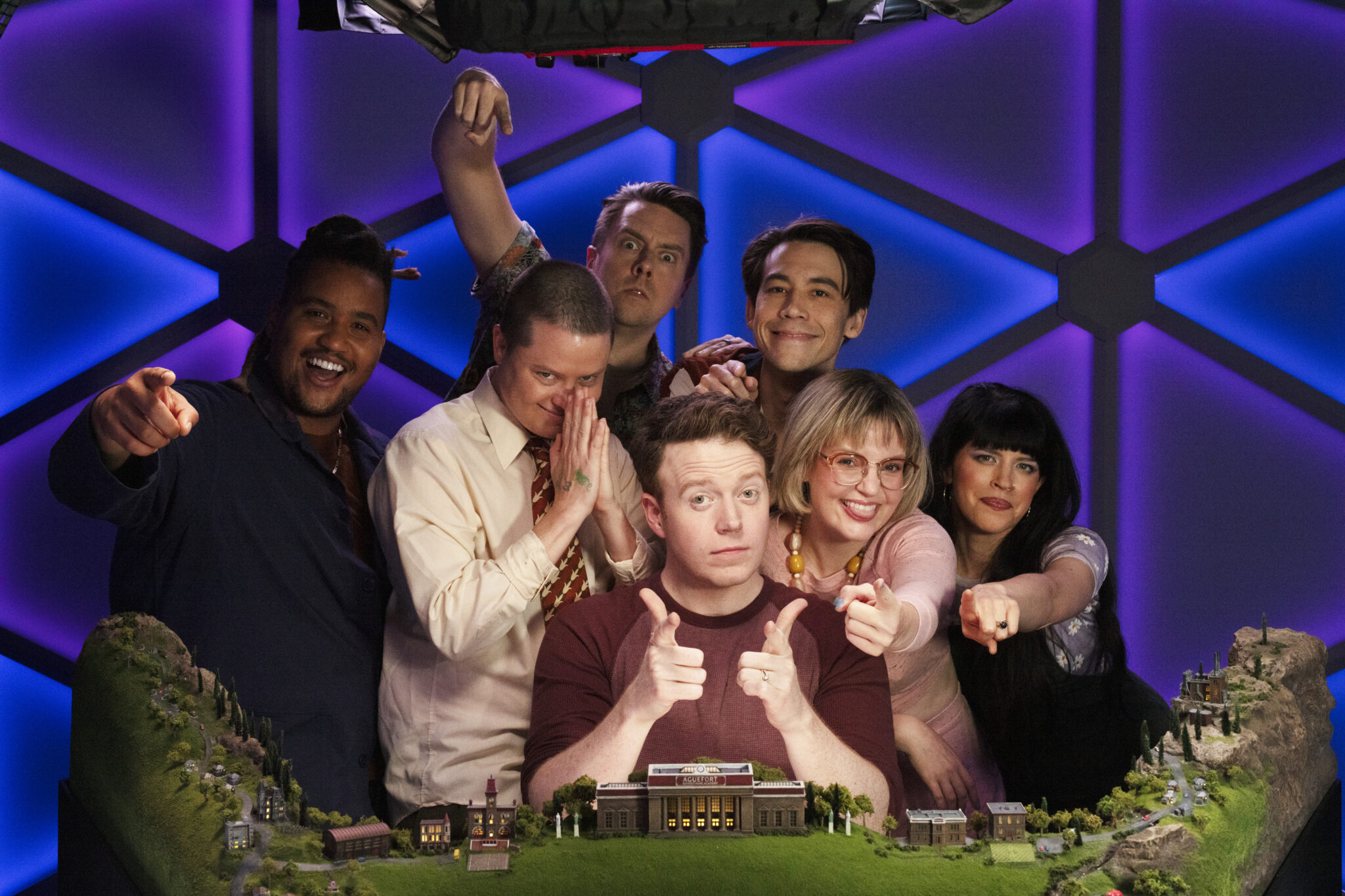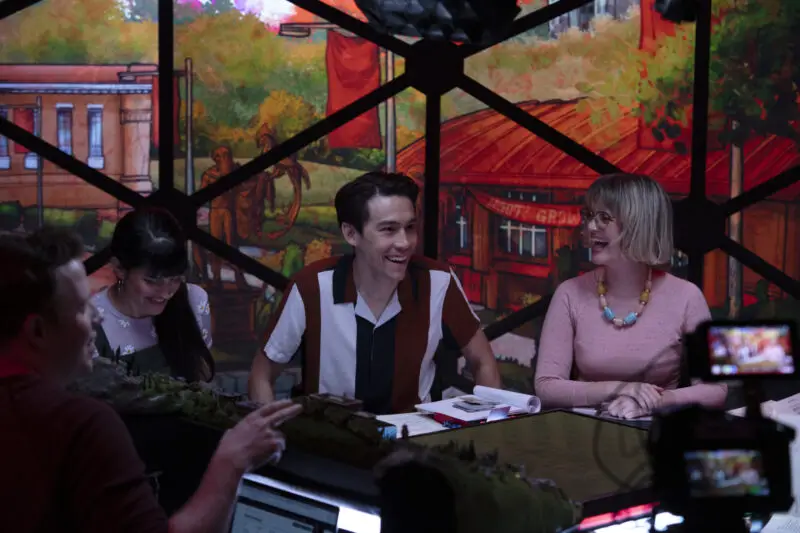Fantasy High Junior Year is the third season of Dimension20’s flagship setting – a John Hughes inspired adventuring academy. The show centers around a found family of misfit adventurers who save the world time and time again, yet still have to operate within the restrictions of High School life. This season finds the Intrepid Heros navigating their junior year of high school, addressing the responsibilities they’ve ignored while off stopping the apocalypse, and trying their best to figure out their future – all while a strange looming Time Quangle mystery hovers over their head.
You can read the first interview in the mini-series here. The second interview in this mini-series is with Siobhan Thompson, who plays Adaine Abernant a preppy-divination wizard who’s rejection of the classist values of her biological family has left her with the support of the family she’s chosen. In Fantasy High Junior Year we see a more secure version of Adaine, one who will do anything to protect her friends even in the face of immense, panic-inducing, world-ending danger.
The Fandomentals sat down with Thompson to discuss her growth as a writer and performer, the dedication to craft it takes to be a good actual play performer, and the lessons she’s learned about herself through this very silly, very serious game.
This interview has been edited for clarity.

Actual play is a really unique medium. In the last five or six years, moving into this newly developed medium of actual play where you’re both writer and performer at the same time, how has that influenced your performing and writing outside of the medium and how is your work outside the medium informed what you’re doing with Fantasy High Junior Year?
Siobhan Thompson: I think as an actor it spoiled me for anything else, just because I get to have so much fun and I don’t have to audition. I hate auditioning so much. I get to play with my friends and not learn any lines. I get to play as just so many different types of characters and make so many different big choices. In terms of writing, I think it’s almost like going to the gym in that you’re doing those reps of keeping quick and having to make choices so quickly that you have to get to the funniest one immediately. There’s no like sitting and discussing.
Sometimes as a writer, I can get very in my head, which I think is very normal. As a writer, [I often think], “Is this a funny joke? Well, let me go for a walk and think about it for three weeks.” It has definitely helped me go, “No, this is the funny one. I thought of it immediately. This is probably the funny one.” And if it’s not, I’ll go back and fix it later, but I don’t have to worry about it right now.
And then the other way around, I mean, all of us have done so much improv and sketch before we started doing this. Because we all did the work beforehand, it feels very easy, you know? We already pushed the ball up the hill and now we’re just seeing it roll back down again. I don’t have to think about performance that much because I’ve already done it a bunch. I know my tricks, I have my toolbox. I’ve told so many stories that you get to the point where you kind of just see the matrix a little bit and you’re like, “Okay, well, we did this. So probably in three episodes, we should probably get to here then. Right? Okay. Great. Yes.”

The deeply internalized story structure. That makes a lot of sense. I think a lot of people who are coming into actual play as creators now, the newest generation doesn’t always see the decades of experience in working on story prior to that.
Yeah, I mean, I think that it’s very easy to look at Dimension 20 and go, “Oh, that just seems very easy.” And it is easy because we did the work to make it easy. I mean, we also have a huge production company around us and hair and makeup and all of the model makers and Brennan gets paid for months to work on story before we even step into the dome ,but there is a lot to be said for learning your craft and treating yourself like a journeyman.
I think that maybe it’s a little harder to do that now, in that putting stuff on the internet is so much easier than it was when I was coming up. In order to get anywhere [when I was starting], you had to go and do the work, and go and do UCB or whatever training. Years of standup or go and get your BFA. Whereas now, you can just immediately put things on the internet.
I’m glad I did all of my work, not necessarily behind closed doors, but behind doors that were only just a jar.
Yeah, performing to a basement in Brooklyn for like 20 people, most of whom are your friends.
Exactly, it’s very different than putting it on TikTok and getting it ripped apart, which I’m sure most of my stuff would have been when I was young. I don’t know, I didn’t come out of the womb good at this. It takes a lot of practice.
Moving from the more like craft-oriented side of this, there’s a lot of scientific research into TTRPGs about their therapeutic value and the value that they have for mental health. Specifically with Adaine in Fantasy High Junior Year, you navigate pretty severe familial trauma. You also deal with pretty severe mental health and anxiety. With that understanding and nuance of how all stories are this immersive experience to heal ourselves or learn ourselves better, is there anything you’ve learned about yourself by playing Adaine that was not true when you started playing her in 2018?
Well, I certainly wasn’t medicated for my anxiety when I started playing her and I am now. I mean, Adaine is quite different from me, even though she comes from me and there are aspects of her that come from a truth.
Honestly, the most healing part of it for me was getting to be a teenager that has friends because I was a pretty lonely kid. I had a lot of acquaintances, but I had very few close friends. So I think in terms of TTRPG as therapy, that has been the most useful for me [through] Adaine.
I think that’s true for a lot of people though in this game. A lot of people who come to TTRPGs come from a lot of isolation. There’s a community building aspect of tabletop role-playing games that isn’t really inherent in any other performance medium.
Is there anything specifically about Fantasy High Junior Year you want audiences to take away from this season of Fantasy High that maybe they haven’t in other seasons of Dimension 20.
God, I don’t know. I think that…Just like other previous seasons of Dimension 20, and especially other seasons of Fantasy High, I think the big lesson for me is, “Hey, you can rely on your friends when you’re going through tough times.” Like, Ask for help is a big part of this season. Just ask for help when you need it.
And I think that all of us could do a better job at that. Most of us. I think there are some people who are asking for help a little bit too much. We all know who they are. If you don’t know who they are, you’re probably that person. And if you do know who they are, you can probably ask for help more.
Of course, the comedian in you really had to be like, “Hey, this serious, beautiful moment that I’m just, God, I gotta undercut it with some comedy.”
Like, let’s have this caveat here. There’s some people that ask for far too much goddamn help, but for most of us… I don’t know, I’m a hyper independent person, and that’s a lesson for me. I can always ask for help. And people enjoy helping other people. I think that part of creating the village for yourself is allowing other people to help you. I am always so overjoyed when somebody asks me for help. It’s very fun to help your friends. And I think it’s important to remind ourselves that’s open to us.
Dimension 20: Fantasy High Junior Year premiered on Dropout.tv on Jan. 10 at 7 p.m. EST. Episodes air every Wednesday.
Images Courtesy of Dropout
Have strong thoughts about this piece you need to share? Or maybe there’s something else on your mind you’re wanting to talk about with fellow Fandomentals? Head on over to our Community server to join in the conversation!

